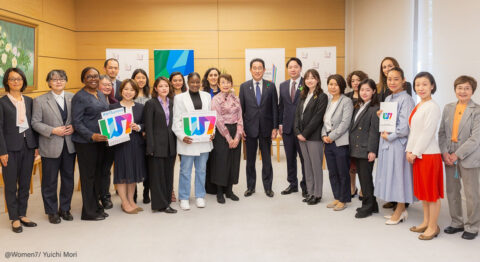
ダウンロード
登録情報
This is a past event. Registration is no longer possible.
DIJ Mailing Lists
Please subscribe below to stay informed about our research activities, events & publications:
Feminist Foreign Policy in Japan? The Localisation of Pro-Gender Norms in Japanese Foreign Policy
2024年2月21日
In recent years, feminist foreign policy (FFP) has become a buzzword in foreign policy, particularly among liberal democracies. It can be used for rebranding oneself as a “good state”, as political scientist Karin Aggestam put it. Although there is currently no single agreed definition of FFP, it has gained some popularity in countries such as Canada, France, Germany, or Chile. At the G7 Summit in Hiroshima in 2023, the Women7 (an official G7 engagement group) advocated for a feminist-informed foreign policy, which was supported by all its members, including Japan.
Since 2015, the Japanese government has been trying to push for more gender equality in its foreign policy. For example, it adopted a National Action Plan on Women, Peace and Security based on UN Security Resolution 1325 which promotes women’s inclusion and gender equality in foreign policy. In 2023, the Kishida cabinet appointed the second woman in Japan’s history as foreign minister and Japan’s latest National Action Plan from the same year includes even more gender-sensitive norms. At the same time, Japan is under intense scrutiny for consistently ranking last among G7 countries on gender equality and women’s empowerment. This clashes sharply with Japan’s international image as an ethically “good state”.
Against this background, this lecture examined how Japan attempts to catch up with the international trend of FFP and the promotion of pro-gender norms in its foreign policy. This project is situated within constructivism and draws on the work of Amitav Acharya’s localisation approach (2004). It identifies norms and their respective interpreters to implement FFP norms in Japanese society that still struggles with gender inequality.
Annika Clasen is a PhD candidate at the Heinrich Heine University in Düsseldorf. She studied Political Science and Japanese Studies at the Universities of Heidelberg, Chiba, and Düsseldorf. Her research focuses on norms and values that influence and/or constitute Japan’s foreign and security policy. Amidst the increasing discussion of feminist foreign policy internationally and the promotion of women’s empowerment in Japan, she investigates how Japan is dealing with this new feminist foreign policy “trend”, by employing the constructivist point of view of localization. She is currently a PhD student at the DIJ. During her stay at the DIJ she interviewed various policymakers and other political agents.